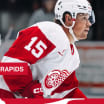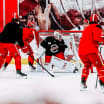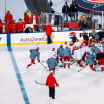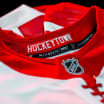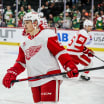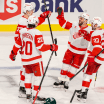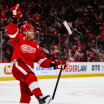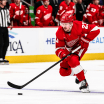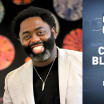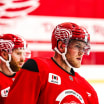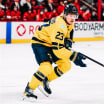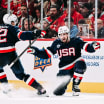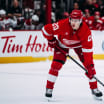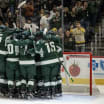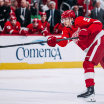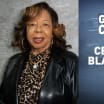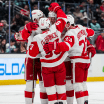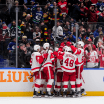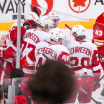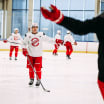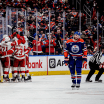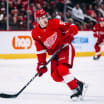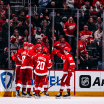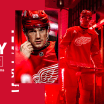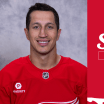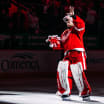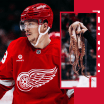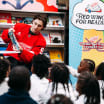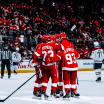On Dec. 12, former Red Wing, University of Michigan player and head coach Red Berenson was inducted in the United States Hockey Hall of fame. Berenson played 987 games in the NHL, won 848 games as Michigan's coach, third most in college hockey history and was one of the first Canadians to choose playing college hockey over following the traditional route of pursuing his NHL dream in Canada. Berenson's Wolverines won 15 Great Lakes Invitational (GLI) titles and with the GLI taking place at Little Caesars Arena on Dec.30-31, DetroitRedWings.com Art Regner sat down with Berenson to discuss his legendary career, the benefits of playing college hockey and his high regard for the GLI.
Q&A with Red Berenson
Celebrated Michigan coach discusses his career, college hockey and the GLI
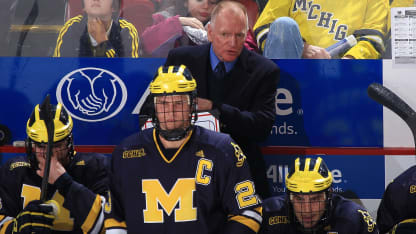
© Dave Reginek/Detroit Red Wings
By
NHL.com @NHLdotcom
Art Regner: Red you were really on the cutting edge. You're a Canadian kid from Regina, Saskatchewan, and you end up playing college hockey, which back then was not really a precedent. It happens all the time today, but what led you to college hockey?
Red Berenson:Well, that's a great comment, because it's true. I mean, none of my peers were going to school and didn't think about going to school. But I got to talk to a few ex-pro players, former NHLers, and I really looked up to these guys, and they told me. They said "Red, go to school. If you're going to make it, you're going to make it. But get an education. There's only six teams. You need something to fall back on." So, I took that to heart, and I did it the way they hoped they would have.
What led you to Michigan of all places?
Well, we went to the library at Regina and we looked up the best hockey school with scholarships. The best education and hockey scholarships. And Michigan was right there at the top, and we write the coach, and the coach responded, and the rest was history. Al Renfrew was the coach. He became one of my life-long friends.
When you look back at your playing career at Michigan, and I know times are different now, and it is completely different as far as not only Canadian young men, but even European young men playing college hockey, but what would you tell somebody today about the advantages of college hockey?
The advantage of college hockey is that you have time to develop. You don't have to be an NHL ready player when you're 19 or 20, but there are the exceptions. You know we had Jacob Trouba, Kyle Connor, and of course Dylan Larkin. All played one year at Michigan, and they ended up going right to the NHL, so it can happen. But for the average player, they need three or four years to develop, and college is a great way to do it. Plus, they have their education. The worst thing you can do, Art, is you can graduate from the University of Michigan, and you know that's a lifelong thing. They can't take that away from you.
Was it Scotty Bowman that really got you into coaching, because I know you're tight with Scotty. How did you end up being a coach? You were the NHL Coach of the Year with the Blues, and then you head over to Michigan.
I had my MBA from Michigan, so I was prepared for life after hockey without coaching. I had no idea I would be a coach. But I played for some good coaches, obviously, and Scotty was the best. When I was in. St. Louis, Barclay Plager took over the team, and he asked me when I would retire that year if I would help him coach the team. I really liked Barclay, and we liked the schools our kids were in in St. Louis, so why upset them and leave town? So, we decided we would try the coaching with Barclay, and as you know he got sick, I had to take over, and things went pretty well. One thing led to another, and I had the opportunity to go to Buffalo and coach with Scotty Bowman and Jimmy Roberts. We were all familiar with each other. We respected each other. And from Buffalo I came to Michigan. So, I guess it was just a combination of things, but it turned out that I was a career coach, and I didn't know it.
I've told you this many times and I know it makes you uncomfortable because you're a humble man. You don't like to toot your own horn, even though your accomplishments are endless. But, there was a rumor before you took the Michigan job that Don Canham (Michigan's Athletic Director) was thinking of making hockey a club sport. The Wolverines had fallen on some hard times. Again, I know you don't like me to tell you this, but you pretty much saved Michigan's hockey program and turned it into the powerhouse that it still is today.
You know, it was amazing. Michigan was a little bit like Detroit. They weren't doing well at the time, and Canham told me. He said, "We gotta get this thing going, or we're not going to be able to keep it," and so I had a little extra motivation to make sure that we got Michigan where it should be. So that was my project.
That was your project, and I remember one time you told me, "I knew I could turn it around. I just didn't think it would take as long as it did."
Well, that's true. We go and we recruit players each year, but we only have so many scholarships in college. It's kind of like a salary cap, except you only lose so many players every year, and so you graduate an average of six players a year, and you recruit six more. It took about three or four years before we really turned a corner, and I can see this is the kind of team that we want to have at Michigan.
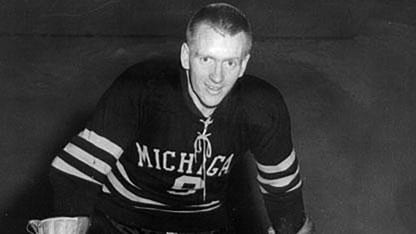
You had some dynamic teams. And I think what everyone likes about the Wolverines and the style under you was that you guys flew up and down the ice. I used to call it the "Mini Montreal Canadiens." That was your game. It was fun, it was exciting, and I would imagine to a young hockey player, especially a forward or a puck moving defenseman, Michigan was the school to go to.
We were really fortunate to be that way. That was our goal, Art. People asked me, "How are you going to play?" and I would say, "We're going to play like the old Montreal Canadiens of the 70's, and the Oilers of the 80's and the Red Wings, as it turned out, of the 90's," and we attracted offensive-minded players, fast players, and players that really wanted to play with the puck, and then we tried to teach them how to play without the puck. We were lucky. We had a lot of really great players to work with, and ask any coach, the better your players are, the better the coach is going to be.
When you retired, was it difficult to walk away? Was it time? Were you at peace? I can't imagine Michigan, and I love Mel Pearson too, without you behind that bench.
It's perfect. It was time. Warde Manuel was really good about allowing me to retire and allowing me to have some input into helping him find the next coach, and I think Mel Pearson is doing a great job. I have no regrets. I go to our home games, I know everybody at the rink. It's perfect. And I can sleep at night, and I don't have to worry about the power play. I'm really enjoying it. It was the right time.
To have the rink named the Red Berenson Rink at Yost Ice Arena must be real special.
It was a big surprise. It was a great gesture, and the little things that Michigan's done for me and to help us along our way, it's been great, so I'm really blessed.
I have a running joke. Last year, the 53rd GLI was played on January 1 and 2 because of the schedule at Little Caesars Arena, so it's been gone for a year, and now it's back. Technically, it wasn't played in 2017. It's going to be played twice in 2018. It gets underway on Sunday December 30 with Michigan Tech and Michigan facing off at 1 p.m. followed by Lake Superior State and Michigan State. The GLI is the oldest college hockey tournament. What does it mean to college hockey and to this area?
It's a great tournament…They never had it when I played. They started it about '64. I think Lincoln Cavalieri helped start the GLI with Michigan Tech and Michigan as the host and then Michigan State became tri-host, but the thing I remember about it was so many players couldn't wait to play at Joe Louis Arena. They were so excited to play there, and some of the games were memorable overtime games and so on, and the players looked forward to it so much. So did the coaches. The players will tell you some of their greatest memories. When we got going in the GLI we couldn't lose. I think Michigan won it for nine or 10 years in a row, and then we still had good teams and we couldn't win it for about nine or 10 years. It's competitive. Every team that comes here can't wait to play. The fans enjoy it, and you know, the benefactors are all the young players around the state of Michigan. They see that tournament, and they say "I want to play for one of those schools." That was a great recruiting tool. I'm sure Dylan Larkin saw a lot of GLIs before he ever got to Michigan.
I think Dylan Larkin did and Luke Glendening, which is really a tremendous story in its own right. Assistant coach Billy Powers goes to look at another guy at a prep school out East, sees Luke, he comes to Michigan, makes the team as a freshman, is an alternate captain as a sophomore and then junior and senior (year) he's captain of Michigan. Luke Glendening is a special athlete.
He really is. I remember telling Luke, "I don't know if you're going to be able to play here or not. We'll have to see how you fit in and how hard you work in practice," but you didn't have to tell Luke Glendening to work hard. He outworked everybody, every day, every drill. He did it right. The coaches looked at each other and said, "This kid's going to play soon," and once he started playing, that was it. He kept playing.
Getting back to this year's GLI, Michigan on paper looks like a very loaded team. They're scoring a lot of goals, maybe giving up a few too many than Mel would like to see, but then you throw Michigan Tech, Lake State and MSU into the mix, it doesn't really get better than that.
It really doesn't. You know, with Mel being a former Michigan Tech coach, you know he's going to have his hands full against a coordinated Michigan Tech program, and we played Lake State and they're off to a good start, and Michigan State is going to be much improved this year. I think their coach, Danton Cole, is going to do a great job with them. I think this could be one of the better GLIs we've seen in recent years.
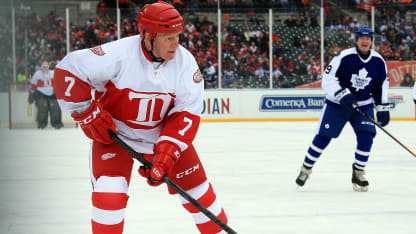
© Dave Reginek/Detroit Red Wings
Red, obviously hockey has changed, but you were one of the first players to wear a helmet. I'm sure you probably took a lot of guff for that in the beginning, but the state of the game - Do you like where hockey is at? Do you like how it's evolving? Maybe it's always been this way, but it seems to be such a universal game now.
It really is. When you talk about hockey, we think of the NHL, but I have four granddaughters and two of them are hockey players. They're 10 and 14, and they love it. They're going through all the things we did as kids with the girls' team. One girl plays on the boys' team. She's the biggest body on the team, and she's really enjoying it. It's not just for the boys. I love where the NHL is. You look at all the Europeans. Think about it, Art. When I left Michigan in 1962 and turned pro there was one American in the NHL and that was Tommy Williams. There was one college player in the NHL and that was Red Hay, and he became rookie of the year that year, and he's from my hometown. And there was one European player, and that was a Swede that played for the Rangers, but he was a limited player. That was it. And now look at all the American players in the game. Look at all the college players. Look at all the European players. The game is a global sport now.
Well, Red, it's always great catching up with you any time I can talk hockey with you, it's a good day. Thank you.
Art, this is really good.
The 54th Great Lakes Invitational will be played on Dec. 30-31 at Little Caesars Arena with Michigan Tech and Michigan facing off at 1 p.m. on the 30th, followed by Lake Superior State and Michigan State at 4 p.m. The third-place game will be played on the 31st at 11:30 a.m., with the GLI Championship Game slated to begin at 2:30 p.m.


